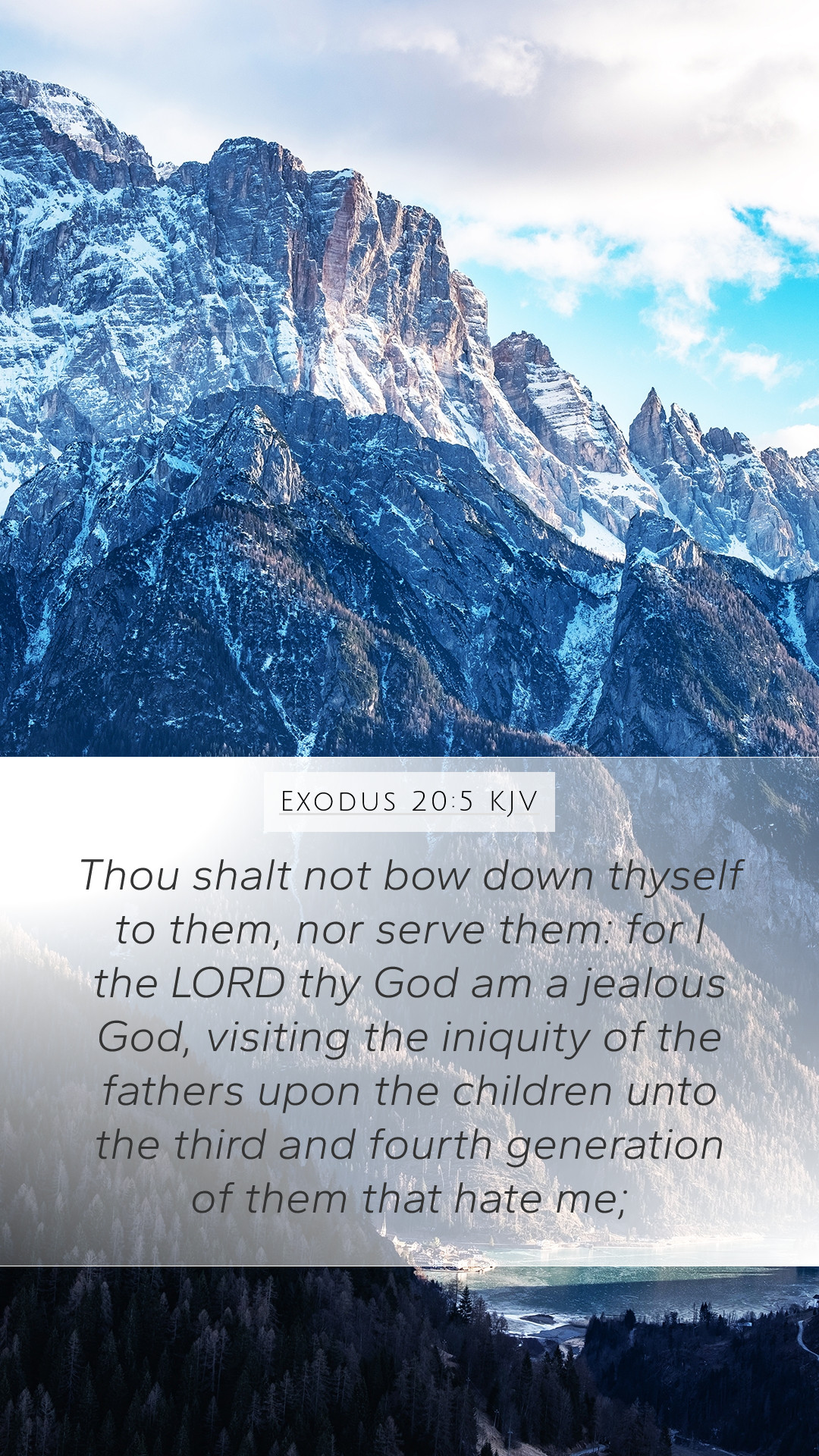Understanding Exodus 20:5
Verse: Exodus 20:5 - "You shall not bow down to them or serve them, for I the Lord your God am a jealous God, visiting the iniquity of the fathers on the children to the third and the fourth generation of those who hate me."
Overview of Exodus 20:5
Exodus 20:5 is found within the Ten Commandments, serving as a directive against idolatry. This verse emphasizes the seriousness of loyalty to God and the repercussions of turning away from Him to serve other deities. The use of the term "jealous" reflects God's desire for exclusive devotion from His people.
Bible Verse Meanings
This verse communicates profound theological implications regarding God's nature and the consequences of sin. It suggests that God has emotional investment in the relationship with His people, hence the term "jealous." Furthermore, the verse alludes to the generational impact of sin, indicating that the consequences of disobedience may extend beyond the individual.
- Jealous God: God’s jealousy signifies His zeal for His people; He longs for a pure relationship without rivals.
- Visiting iniquity: This phrase indicates God's judgment on sin, highlighting the seriousness of transgressions against Him.
- Generational consequences: The notion that the iniquities of the fathers can affect their children emphasizes the impact of one's actions on future generations.
Bible Verse Interpretations
Wise interpretation of Exodus 20:5, as articulated by Matthew Henry, underscores that fidelity to God requires excluding all forms of idolatry. This echoes the idea that the relationships and actions of parents significantly shape the faith and behaviors of their children.
Albert Barnes adds that this verse is meant to instill a sense of seriousness regarding the worship of God, instilling a warning against the severe consequences of idolatry both personally and generationally.
Adam Clarke emphasizes that the term "jealous" does not suggest insecurity on God's part but rather an invite to a passionate and undivided devotion.
Applying Bible Verses to Daily Life
The application of Exodus 20:5 presents a call to evaluate personal loyalties and the subtleties of modern idolatry. In a contemporary context, idolatry may manifest as excessive attachment to possessions, relationships, or ambitions that distract from one’s relationship with God.
- Self-Reflection: Periodically assess what competing interests may be present in your life that distract from God.
- Generational Influence: Consider how your faith and actions influence your children and community, thereby shaping future generations.
- Faithfulness to God: Make conscious choices that promote fidelity to God and encourage others to do the same.
Related Cross References
- Deuteronomy 5:9: Reinforces the notion of God's jealousy and the consequences of idolatry.
- Numbers 14:18: Expounds on God's mercy and justice, emphasizing visitation of iniquities.
- Exodus 34:14: Further exemplifies God's jealousy, reiterating the importance of exclusivity in worship.
- Psalm 78:3-4: Highlights the need to pass down faith and the works of God to subsequent generations.
- Luke 14:26: Jesus speaks to the commitment required for true discipleship, echoing the exclusivity called for in Exodus.
Conclusion
In summary, Exodus 20:5 serves as a pivotal reminder of the need for undivided allegiance to God. Through careful analysis, we can glean invaluable insights for our faith journeys. This verse challenges us to identify and reject modern forms of idolatry, focusing on God's call for exclusive devotion and the reverberating impact that our faith, or lack thereof, can have on future generations.
Engaging in Bible Study
For those engaging in Bible study, whether in Bible study groups or through online Bible study platforms, this verse provides rich material for discussion and reflection. Utilizing Bible study tools and guides can enhance our understanding of difficult Bible passages and allow us to explore the significance of Jesus' teachings in a broader context.
If you're interested in in-depth Bible verse analysis, consider forming a group focused on the historical context of Bible verses and how they relate to our modern-day lives.


